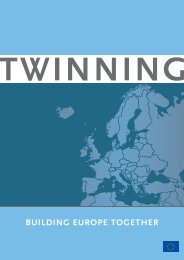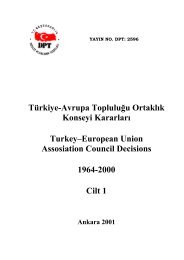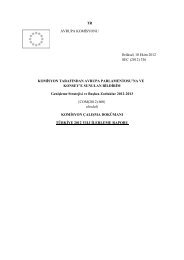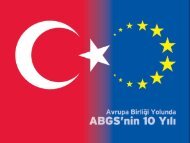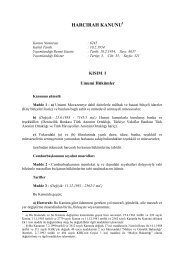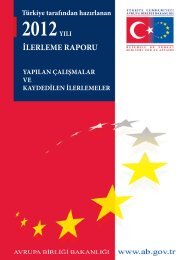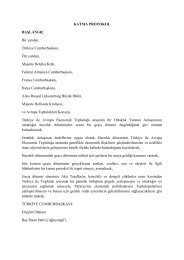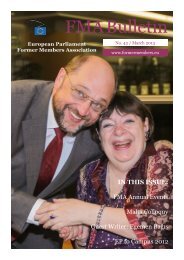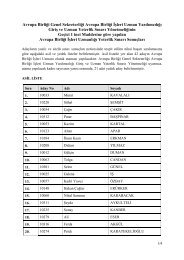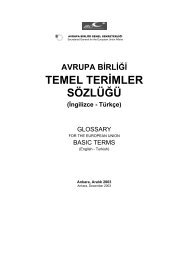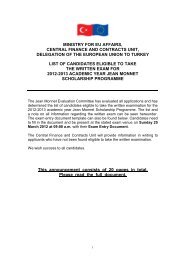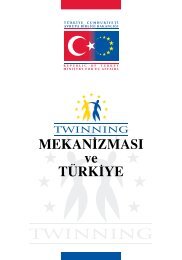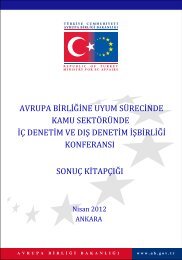2010 ilerleme raporu - Avrupa BirliÄi BakanlıÄı
2010 ilerleme raporu - Avrupa BirliÄi BakanlıÄı
2010 ilerleme raporu - Avrupa BirliÄi BakanlıÄı
You also want an ePaper? Increase the reach of your titles
YUMPU automatically turns print PDFs into web optimized ePapers that Google loves.
public health, there has been good progress in terms of legislative alignment. However,<br />
enforcement remains insufficient in areas other than tobacco. The administrative structures<br />
and enforcement powers necessary to implement the transposed legislation and monitor<br />
progress require strengthening. Preparations in the area of consumer and health protection are<br />
on track.<br />
4.29. Chapter 29: Customs Union<br />
There has been some progress with regard to customs legislation.<br />
Turkey adopted the provisions implementing its new customs law, further aligning its customs<br />
rules with the EU acquis. The Undersecretariat for customs adopted implementing legislation<br />
on binding tariff information that limits the rights of economic operators to apply for binding<br />
tariff information, particularly those importing products that are subject to mandatory<br />
laboratory testing. The Undersecretariat amended the implementing provisions on laboratory<br />
controls for processed agricultural products to limit mandatory laboratory controls exclusively<br />
to cases where the products are imported in bulk or their tariff classification cannot be<br />
determined by customs. The overall level of alignment with the EU acquis in the field of<br />
customs rules is high thanks also to the existence of the EU-Turkey Customs Union.<br />
However, further alignment is required with regard to customs rules on intellectual property<br />
rights and on the exemptions granted to goods used or consumed in the free zones regulated<br />
by the Undersecretariat for foreign trade. The Turkish duty relief legislation allowing dutyfree<br />
shops at entry points is not in line with Turkey’s Customs Union obligations.<br />
There has been no alignment regarding the rules on surveillance of imports and exports of<br />
goodsand tariff quotas. In particular, the legislation for tariff quotas provided for processed<br />
agricultural products is not in place and the management of the few existing tariff quotas is<br />
not in line with EU standards. Products originating outside the EU but in free circulation in<br />
the EU market are still subject to product safety inspections in Turkey, even if the goods have<br />
already been cleared by customs in the EU, bear the CE mark and are accompanied by an<br />
ATR movement certificate. In the context of these inspections, economic operators are<br />
systematically obliged to submit a declaration of origin before customs clearance. Requiring<br />
operators to declare the origin of products before their customs clearance is an infringement<br />
of the Customs Union.<br />
As regards administrative and operational capacity, some progress can be reported. The<br />
Undersecretariat strengthened its vehicle tracking system and mobile inspection units.<br />
Through public-private partnership contracts signed with Turkish private sector organisations,<br />
the Undersecretariat was supplied with scanners that further enhanced its enforcement<br />
capacity at some border crossing points. The Undersecretariat has to improve its risk-based<br />
analysis with a view to applying it soundly and uniformly throughout all customs offices. The<br />
feedback reporting mechanisms between the Undersecretariat’s central risk analysis units and<br />
regional customs teams should be reinforced. Coordination between customs enforcement and<br />
other law enforcement agencies at the border needs to be improved. Simplified procedures<br />
need to be applied in order to facilitate legitimate trade by reducing physical inspections.<br />
Turkey continued to be one of the main suppliers of counterfeit goods seized at EU customs<br />
and lacks enforcement capacity for IPR controls on both imports and exports.<br />
Further efforts were made towards achieving IT interconnectivity with the EU systems on<br />
transit (NCTS) and tariffs (TARIC, Quota, and Surveillance). Turkey reached a high level of<br />
alignment in the field of transit with a view to starting the process for acceding to the<br />
EN 93 EN



